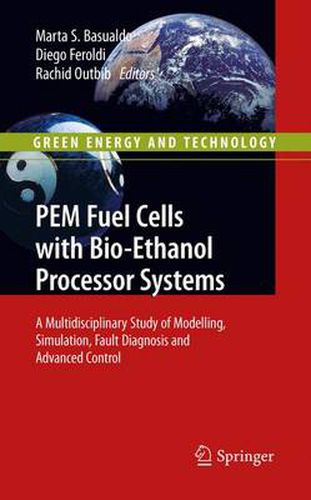Readings Newsletter
Become a Readings Member to make your shopping experience even easier.
Sign in or sign up for free!
You’re not far away from qualifying for FREE standard shipping within Australia
You’ve qualified for FREE standard shipping within Australia
The cart is loading…






This title is printed to order. This book may have been self-published. If so, we cannot guarantee the quality of the content. In the main most books will have gone through the editing process however some may not. We therefore suggest that you be aware of this before ordering this book. If in doubt check either the author or publisher’s details as we are unable to accept any returns unless they are faulty. Please contact us if you have any questions.
An apparently appropriate control scheme for PEM fuel cells may actually lead to an inoperable plant when it is connected to other unit operations in a process with recycle streams and energy integration. PEM Fuel Cells with Bio-Ethanol Processor Systems presents a control system design that provides basic regulation of the hydrogen production process with PEM fuel cells. It then goes on to construct a fault diagnosis system to improve plant safety above this control structure.
PEM Fuel Cells with Bio-Ethanol Processor Systems is divided into two parts: the first covers fuel cells and the second discusses plants for hydrogen production from bio-ethanol to feed PEM fuel cells. Both parts give detailed analyses of modeling, simulation, advanced control, and fault diagnosis. They give an extensive, in-depth discussion of the problems that can occur in fuel cell systems and propose a way to control these systems through advanced control algorithms. A significant part of the book is also given over to computer-aided engineering software tools that can be used to evaluate the dynamic performance of the overall plant.
PEM Fuel Cells with Bio-Ethanol Processor Systems is intended for use by researchers and advanced students on chemical, electrical-electronic and mechanical engineering courses in which dynamics and control are incorporated with the traditional steady-state coverage of flowsheet synthesis, engineering economics and optimization.
$9.00 standard shipping within Australia
FREE standard shipping within Australia for orders over $100.00
Express & International shipping calculated at checkout
This title is printed to order. This book may have been self-published. If so, we cannot guarantee the quality of the content. In the main most books will have gone through the editing process however some may not. We therefore suggest that you be aware of this before ordering this book. If in doubt check either the author or publisher’s details as we are unable to accept any returns unless they are faulty. Please contact us if you have any questions.
An apparently appropriate control scheme for PEM fuel cells may actually lead to an inoperable plant when it is connected to other unit operations in a process with recycle streams and energy integration. PEM Fuel Cells with Bio-Ethanol Processor Systems presents a control system design that provides basic regulation of the hydrogen production process with PEM fuel cells. It then goes on to construct a fault diagnosis system to improve plant safety above this control structure.
PEM Fuel Cells with Bio-Ethanol Processor Systems is divided into two parts: the first covers fuel cells and the second discusses plants for hydrogen production from bio-ethanol to feed PEM fuel cells. Both parts give detailed analyses of modeling, simulation, advanced control, and fault diagnosis. They give an extensive, in-depth discussion of the problems that can occur in fuel cell systems and propose a way to control these systems through advanced control algorithms. A significant part of the book is also given over to computer-aided engineering software tools that can be used to evaluate the dynamic performance of the overall plant.
PEM Fuel Cells with Bio-Ethanol Processor Systems is intended for use by researchers and advanced students on chemical, electrical-electronic and mechanical engineering courses in which dynamics and control are incorporated with the traditional steady-state coverage of flowsheet synthesis, engineering economics and optimization.